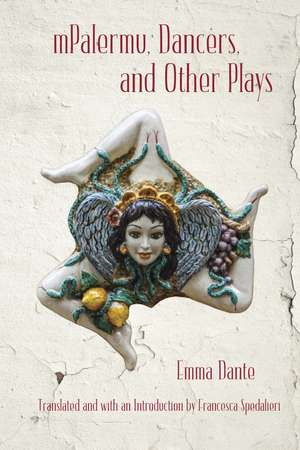mPalermu, Dancers, and Other Plays
Autor Emma Dante, Francesca Spedalieri Ilustrat de Carmine Maringolaen Limba Engleză Paperback – 20 feb 2020
This exquisite first English translation of Emma Dante’s work enables English-speaking readers, theatre scholars, and directors alike to encounter character-driven “civic theatre” with its portraits of individuals existing at the fringes of Italy. Ultimately, it allows us to “listen” to those who are not given a voice anywhere else.
Preț: 156.02 lei
Preț vechi: 199.80 lei
-22% Nou
Puncte Express: 234
Preț estimativ în valută:
29.86€ • 31.13$ • 24.81£
29.86€ • 31.13$ • 24.81£
Carte indisponibilă temporar
Doresc să fiu notificat când acest titlu va fi disponibil:
Se trimite...
Preluare comenzi: 021 569.72.76
Specificații
ISBN-13: 9780997228755
ISBN-10: 099722875X
Pagini: 320
Ilustrații: 8 halftones
Dimensiuni: 152 x 229 x 30 mm
Greutate: 0.5 kg
Editura: Swan Isle Press
Colecția Swan Isle Press
ISBN-10: 099722875X
Pagini: 320
Ilustrații: 8 halftones
Dimensiuni: 152 x 229 x 30 mm
Greutate: 0.5 kg
Editura: Swan Isle Press
Colecția Swan Isle Press
Notă biografică
Born in Palermo in 1967, Emma Dante is a playwright and director. Francesca Spedalieri is a visiting assistant professor of English and women’s, gender, and sexuality studies at Stony Brook University.
Recenzii
"The Sicilian playwright Emma Dante is the subject of Francesca Spedalieri’s essay and her translation of an excerpt of the play mPalermu. Spedalieri traces how the interweaving of Palermitan dialect and standard Italian recapitulates the characters’ ambiguous position between their regional identity and their longing to join the cultural and linguistic mainstream of a country that relegates them to near-colonial status. Spedalieri’s 'foreignized' translation makes this contradiction audible, palpable to English-speaking audiences."
“The trilogy is a small masterpiece of contemporary Italian theatre, and it is certainly the masterpiece of Sicilian theatre since years and years and years.”
"Spedalieri’s brilliant translations take us to southern Italy and encourage us to dive into Emma Dante’s theatrical universe. In Dante’s twisted cosmos, grotesque cruelty and systemic violence, especially violence against women, is exposed with an energizing dose of black humor.”
"While in Faulkner’s The Sound and The Fury the simultaneous existence of past, present, and future is, for the protagonist, an element of alienation, in Dante’s trilogy it is the essence itself of her playwriting.
Temporal compression is the font of dynamic energy that keeps her theatrical universe alive.
A universe that knows well that it can only exist on an empty stage. It knows it can’t live elsewhere, it is denied even papier mâché facsimiles or a paper sky. And so it happens that characters do not hesitate to reveal this self-awareness to the spectators – often speaking to them directly, threatening them, or attempting to distract them by telling them stories. At times, the characters are self-conscious of the gaze of the audience, they feel their intimacy too exposed to others’ eyes, they’d like to act in secrecy, hidden from them, but they can’t. They are condemned to consciously perform themselves forever. Which is, after all, the sentence facing today’s humankind."
Temporal compression is the font of dynamic energy that keeps her theatrical universe alive.
A universe that knows well that it can only exist on an empty stage. It knows it can’t live elsewhere, it is denied even papier mâché facsimiles or a paper sky. And so it happens that characters do not hesitate to reveal this self-awareness to the spectators – often speaking to them directly, threatening them, or attempting to distract them by telling them stories. At times, the characters are self-conscious of the gaze of the audience, they feel their intimacy too exposed to others’ eyes, they’d like to act in secrecy, hidden from them, but they can’t. They are condemned to consciously perform themselves forever. Which is, after all, the sentence facing today’s humankind."
"[...] an example of “civic theatre;” a theatre striving for social justice that touches upon disparate social concerns, from gender inequality and gendered violence, to long-standing economic and cultural dynamics of power within the Italian nation."
